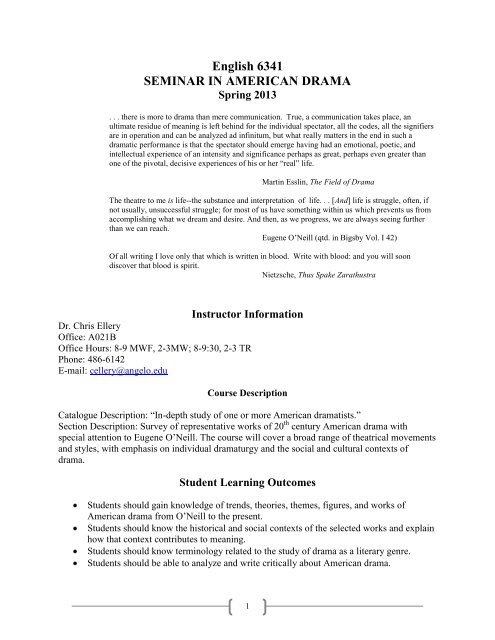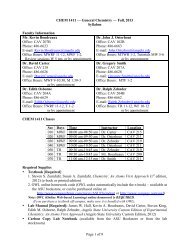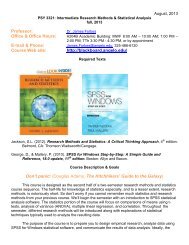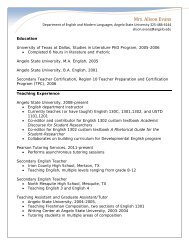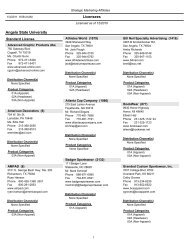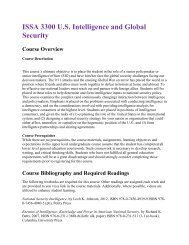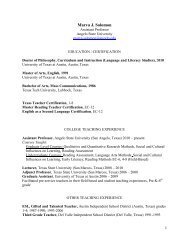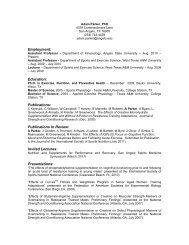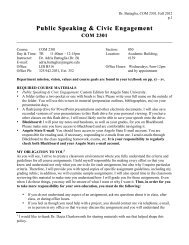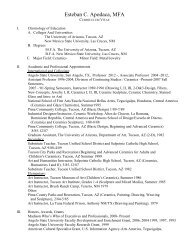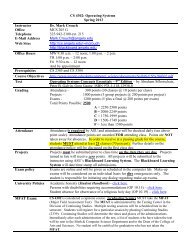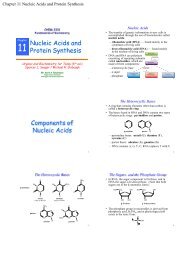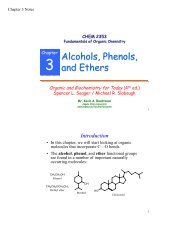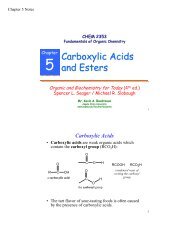English 6341 SEMINAR IN AMERICAN DRAMA - Angelo State ...
English 6341 SEMINAR IN AMERICAN DRAMA - Angelo State ...
English 6341 SEMINAR IN AMERICAN DRAMA - Angelo State ...
You also want an ePaper? Increase the reach of your titles
YUMPU automatically turns print PDFs into web optimized ePapers that Google loves.
<strong>English</strong> <strong>6341</strong><br />
<strong>SEM<strong>IN</strong>AR</strong> <strong>IN</strong> <strong>AMERICAN</strong> <strong>DRAMA</strong><br />
Spring 2013<br />
. . . there is more to drama than mere communication. True, a communication takes place, an<br />
ultimate residue of meaning is left behind for the individual spectator, all the codes, all the signifiers<br />
are in operation and can be analyzed ad infinitum, but what really matters in the end in such a<br />
dramatic performance is that the spectator should emerge having had an emotional, poetic, and<br />
intellectual experience of an intensity and significance perhaps as great, perhaps even greater than<br />
one of the pivotal, decisive experiences of his or her “real” life.<br />
1<br />
Martin Esslin, The Field of Drama<br />
The theatre to me is life--the substance and interpretation of life. . . [And] life is struggle, often, if<br />
not usually, unsuccessful struggle; for most of us have something within us which prevents us from<br />
accomplishing what we dream and desire. And then, as we progress, we are always seeing further<br />
than we can reach.<br />
Eugene O’Neill (qtd. in Bigsby Vol. I 42)<br />
Of all writing I love only that which is written in blood. Write with blood: and you will soon<br />
discover that blood is spirit.<br />
Nietzsche, Thus Spake Zarathustra<br />
Instructor Information<br />
Dr. Chris Ellery<br />
Office: A021B<br />
Office Hours: 8-9 MWF, 2-3MW; 8-9:30, 2-3 TR<br />
Phone: 486-6142<br />
E-mail: cellery@angelo.edu<br />
Course Description<br />
Catalogue Description: “In-depth study of one or more American dramatists.”<br />
Section Description: Survey of representative works of 20 th century American drama with<br />
special attention to Eugene O’Neill. The course will cover a broad range of theatrical movements<br />
and styles, with emphasis on individual dramaturgy and the social and cultural contexts of<br />
drama.<br />
Student Learning Outcomes<br />
Students should gain knowledge of trends, theories, themes, figures, and works of<br />
American drama from O’Neill to the present.<br />
Students should know the historical and social contexts of the selected works and explain<br />
how that context contributes to meaning.<br />
Students should know terminology related to the study of drama as a literary genre.<br />
Students should be able to analyze and write critically about American drama.
Texts<br />
Albee, Edward. Collected Plays of Edward Albee: 1958-1965. New York and London: Overlook<br />
Duckworth, 2007.<br />
Glaspell, Susan. “Trifles.” [handout]<br />
Miller, Arthur. Death of a Salesman. New York: Viking Critical Library, Penguin, 1996.<br />
Norman, Marsha. ‘night Mother. New York: Dramatists Play Service, 1998.<br />
Nottage, Lynn. Ruined. New York: Dramatists Play Service, Inc., 2010.<br />
Odets, Clifford. Waiting for Lefty and Other Plays. New York: Grove Press, 1994.<br />
O’Neill, Eugene. Three Great Plays: The Emperor Jones, Anna Christie and The Hairy Ape.<br />
Mineola, NY: Dover, 2005.<br />
---. The Iceman Cometh. New Haven and London: Yale UP, 2006.<br />
---. Long Day’s Journey into Night. New Haven and London: Yale UP, 1989.<br />
Williams, Tennessee. Streetcar Named Desire. New York: New Directions, 2004<br />
Wilson, August. Ma Rainey’s Black Bottom. New York: Theater Communications Group, 1981.<br />
Daily Work 20%<br />
Conference Paper 40%<br />
Presentation 10%<br />
Exams 30%<br />
Grading<br />
Daily Work includes weekly response essays (see below for instructions) and miscellaneous inclass<br />
quizzes, exercises, and activities. The Conference Paper will be an 8-10 page essay<br />
suitable for reading at SCMLA or other conference. For the Presentation, each student will<br />
introduce a topic relevant to one of the playwrights. There will be two Exams, somewhat in the<br />
style of the current MA departmental exam.<br />
Response Essays: Students should write a short response (150-250 words) on each week’s<br />
reading. Do not summarize the play; rather, focus on an interesting image, character, theme,<br />
symbol or symbolic action. I am looking for some evidence of close reading here. Consider the<br />
following questions to help you get started:<br />
What details (signifiers) stood out in the reading?<br />
What was most interesting? Most confusing? Most disturbing?<br />
What concerns or points do you want to talk about during class?<br />
What questions do you have about the play?<br />
What do you like? Dislike?<br />
If you were leading the class discussion, what is the first question you would ask?<br />
Each response should be printed (double-spaced) and ready to hand in at the beginning of class.<br />
2
Attendance and Make-up Policy<br />
Regular attendance is essential for success in the course. Be prepared for class each week. You<br />
are responsible for obtaining and making up missed assignments. You must have a legitimate<br />
(documented) excuse to make up any assignment, and the nature of all make-up work is at the<br />
instructor’s discretion. Points for most in-class activities cannot be made up, even if the absence<br />
is excused.<br />
Departmental Policy on Academic Honesty<br />
“<strong>Angelo</strong> <strong>State</strong> University expects its students to maintain complete honesty and integrity in their<br />
academic pursuits. Students are responsible for understanding the Academic Honor Code, which<br />
is contained in both print and web versions (www.angelo.edu/forms/pdf/honorcode5.pdf) of the<br />
Student Handbook.”<br />
Accommodations for Disabilities<br />
“Persons with disabilities that may warrant academic accommodations must contact the Student<br />
Life Office, Room 112 University Center, in order to request such accommodations prior to any<br />
being implemented. You are encouraged to make this request early in the semester so that<br />
appropriate arrangements can be made.” (Dean of Student Life)<br />
Selected Resources<br />
ASU Reference Works:<br />
American Playwrights (Ref. PS351 .M35)<br />
American Drama Criticism (Ref. PS332 .F44)<br />
Cambridge Guide to American Theatre (Ref. PN2220.C35 1993)<br />
Contemporary Dramatists (Ref. PR737 .C57 1993)<br />
Guide to American Drama Explication (Ref. PS332 .O84 1995)<br />
20th Century American Drama (DLB 7) (Ref. PN451 .D53 vol. 7)<br />
ASU Periodicals:<br />
American Theatre<br />
American Literature<br />
Journal of American Studies<br />
The Drama Review (TDR)<br />
Performing Arts Journal (PAJ)<br />
Blackboard<br />
3<br />
Theatre Journal<br />
New Theatre Quarterly<br />
Modern Drama<br />
Eugene O’Neill Newsletter<br />
Eugene O’Neill Review<br />
Blackboard (Bb) will be used for posting content (handouts) and class announcements. You<br />
should receive an e-mail when new announcements and handouts are posted.
Tentative Schedule<br />
T 1/15 Introduction: Reading Drama as a Genre<br />
Lecture/Discussion: Provincetown and the New American Drama<br />
Susan Glaspell, “Trifles” (1916) [handout]<br />
T 1/22 Lecture/Discussion: Modernism, Expressionism, and Comedy<br />
Eugene O’Neill, The Emperor Jones (1920) and The Hairy Ape (1922)<br />
T 1/29 Student Presentation: Freud, Jung, and Mythological Criticism<br />
O’Neill, The Iceman Cometh (1939)<br />
T 2/5 Student Presentation: Nietzsche on Tragedy<br />
O’Neill, Long Day’s Journey into Night (1941)<br />
T 2/12 Student Presentation: Marxist Criticism and Left-wing Theater of the 1930s<br />
Clifford Odets, Waiting for Lefty (1935) and Awake and Sing (1935)<br />
T 2/19 Student Presentation: The Southern Renaissance<br />
Tennessee Williams, Streetcar Named Desire (1947)<br />
T 2/26 Mid-term Exam<br />
T 3/5 Student Presentation: Arthur Miller’s Moral Vision<br />
Arthur Miller, Death of a Salesman (1949)<br />
T 3/12 Spring Break<br />
T 3/19 Student Presentation: Theater of the Absurd<br />
Edward Albee, The Zoo Story (1959) and The American Dream (1961)<br />
T 3/26 Student Presentation: Naturalism and Postmodernism<br />
Albee, Who’s Afraid of Virginia Woolf (1962)<br />
T 4/2 Student Presentation: African-American Drama<br />
August Wilson, Ma Rainey’s Black Bottom (1982)<br />
T 4/9 Student Presentation: Gender Theory and Feminist Criticism<br />
Marsha Norman, ‘night Mother (1983)<br />
T 4/16 Student Presentation: Post-colonialist Criticism<br />
Lynn Nottage, Ruined (2010)<br />
T 4/23 Conference Papers<br />
T 4/30 Conference Papers and Review<br />
T 5/7 Final Exam<br />
4


